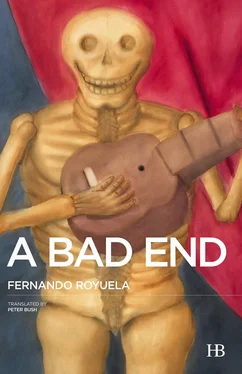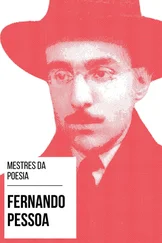Fernando Royuela - A Bad End
Здесь есть возможность читать онлайн «Fernando Royuela - A Bad End» весь текст электронной книги совершенно бесплатно (целиком полную версию без сокращений). В некоторых случаях можно слушать аудио, скачать через торрент в формате fb2 и присутствует краткое содержание. Год выпуска: 2016, Издательство: Hispabooks, Жанр: Современная проза, на английском языке. Описание произведения, (предисловие) а так же отзывы посетителей доступны на портале библиотеки ЛибКат.
- Название:A Bad End
- Автор:
- Издательство:Hispabooks
- Жанр:
- Год:2016
- ISBN:нет данных
- Рейтинг книги:3 / 5. Голосов: 1
-
Избранное:Добавить в избранное
- Отзывы:
-
Ваша оценка:
- 60
- 1
- 2
- 3
- 4
- 5
A Bad End: краткое содержание, описание и аннотация
Предлагаем к чтению аннотацию, описание, краткое содержание или предисловие (зависит от того, что написал сам автор книги «A Bad End»). Если вы не нашли необходимую информацию о книге — напишите в комментариях, мы постараемся отыскать её.
A Bad End — читать онлайн бесплатно полную книгу (весь текст) целиком
Ниже представлен текст книги, разбитый по страницам. Система сохранения места последней прочитанной страницы, позволяет с удобством читать онлайн бесплатно книгу «A Bad End», без необходимости каждый раз заново искать на чём Вы остановились. Поставьте закладку, и сможете в любой момент перейти на страницу, на которой закончили чтение.
Интервал:
Закладка:
I thieved a book from the school, the Rhymes by Gustavo Adolfo. The teacher didn’t notice then, but he did once catch me reading it behind the pissing wall. It was evident that he’d gone out to nose around the piss after ordering his pupils to copy out five hundred times José Antonio enlightened the fatherland with his wisdom and sowed the dawn of Spain with his blood . “Who the hell taught you to read? Let me have a look; this isn’t your book, you’ve stolen it. You’re a thief as well as a freak,” he rasped angrily, no doubt because our unexpected encounter had highlighted his own perversions. “People who read poetry aren’t real men. Besides, those who read Bécquer tempt those who are with love’s silly notions. You never will be a man, that’s patently obvious, but at least have an animal’s dignity and don’t aspire to feelings that are inappropriate to your nature.” I didn’t understand what he meant. I simply snatched my book from his hands and ran off. Poor fellow. He met a bad end, the end that awaits all those men who like to wallow in their loneliness, a cold and miserable death that dragged out over two winters.
I’ve always liked to escape from people, to shelter out of the way, to gaze at whatever without being seen, and darn the gaping holes in the cloth of reality with the eager thread of my thoughts. Reading was one way, but not the only one; fasting and masturbation also brought their grain of wisdom. Ninety years ago, Gustavo Adolfo had puked the aesthetics of melancholy all over his Rhymes . Now I picked up the baton and replaced him in the amorous anxiety stakes with my utopian adoration of little Margarita. I would seek out a pigsty, a stable, a dung heap, and in its darkest corner sink into a mire of sighs and self-pity, a smooth-cheeked innocent, unaware that it was, in fact, animal excrement. Over your breast you bow a brow so melancholy, to me you’re like a snapped Madonna lily . Gradually, quite unawares, I was inching up the slippery steps that, irrevocably, sluice into the bewilderment of love. With each poem I read, little Margarita Ceballos’s mother-of-pearl face increasingly seemed to belong to the deity of bliss, the one whose kisses could redeem me from my original defects. I wasn’t any less despicable than I am now, but I was trying to squeeze heaven dry with that blessed meekness that brings submission to the weak and destiny to fools; that was the stuff my dreams were made of. Experience is the great saboteur, time the spoiler, and at the end of the road, there’s only that sediment of unease that settles after the orgasm with which Providence conceives us. I was sired by one bastard of a tramp who stopped at El Paquito’s to relieve three things at once: his bladder, his belly, and his knob; then he disappeared whence he came, on his way to the east coast, to load boxes of fish that finished up as mildewed merchandise in Madrid.
Sergeant Ceballos used to say my mother was a bitch in heat who’d let herself be licked clean for a plate of fly-ridden meat. Sergeant Ceballos was one of those bastards in uniform, though it didn’t stop him from meeting a bad end. The thick, wine-soaked moustache that bristled threateningly from his nostrils couldn’t save him when his time came, what’s more, it contributed to his suffering, because the three gypsy grasshoppers who did him to death used them to string him up from the fruit tree where he atoned for his sins, a maverick apple tree hidden in the mayor’s pear orchard; and then people reckon gypsies don’t have bright ideas. The grocer, whose concubine was Blondie, experienced a similar contretemps years later that taught him a lesson for leaking positions to the Sandinista army. Sergeant Ceballos was knifed simply because he brought it upon himself. If he hadn’t raced after them in their orgy of thievery in the orchard, surely nothing untoward would have happened, but he had to swagger in his fine uniform and take two potshots at the gypsies. He must have been plastered on plonk, otherwise he’d never have dared challenge them. They held nice masses for him, full of candles and Madonna lilies, though they did nothing to resurrect him, and little Margarita became an orphan, juicy and ripe like the mayor’s pears, which her father gave his life to save. They’d loaded up three quarters of the cart when tragedy struck. It was nighttime, the stars were scintillating on the lime deposits in and around the river, and the blades of their knives were exhilarated by that explosion of light. He shot twice. It’s very likely he pulled the trigger four times, but the men in the village said only two actually fired. The gypsies weren’t frightened; on the contrary, they went for him, pummeled the back of his neck, punched him in the stomach, buckled him over, threw him to the ground, and sunk their knives into his guts, then strung him up, still alive, by his moustache from the maverick apple tree that happened to be at hand. That was their bright idea. They could have bashed his skull in or ruthlessly cut through his jugular, but things being what they are and not what we might like them to be, the gypsies strung Sergeant Ceballos up one silvery night after entertaining him with a display of knives, as if they’d just escaped from a poem by Federico. His cheeks turned to rigor mortis leather; the next morning they glistened with hoar frost. The following week the gypsy grasshoppers were caught trying to cross the border into Portugal and were all garroted, first because it was the current fashion and second because that was the judges’ sentence, but by the time they meted out their punishment, Sergeant Ceballos lay half-rotten in the village cemetery, the welcoming little cemetery by the orchard where my brother was heading to pick tomatoes the day the train rolled him over.
Previously, priests were the only ones privy to the details of the stories their parishioners were so good as to tell them in the secrecy of the confessional. When they’d heard them, they imposed some form of penitence and absolved them with a two-fingered gesture. Today, nobody listens. I only had to see you to realize that you’d come to carry out the designs of Providence, that you were here to terminate my life. Providence has its cruel side, and facilitating my meeting with the European commissioner tonight is redolent with unforgiveable sarcasm. These are strange times, and not even you can escape the turmoil, peculiar times when everyone is a prophet in his own land. Sergeant Ceballos, with his dark-purple moustache, his veteran’s honor and cheap swagger, could never have adapted to them. It was just as well he died when he did. By the time they found him that morning, one of the knots stringing him up by his moustache had worked loose and his corpse was swinging with a macabre tick-tock. Magpies, those birds of ill omen, were croaking on his shoulder, and now and then they stuck their beaks into his ear-holes to savor the wax. Smaller beasties and native insects skated over the pool of frozen blood on his shadow. The men from the village scared them off with their cries. “They’ve hung the sergeant by his moustache, they’ve hung the sergeant by his moustache, his belly is slit and one eye is dangling down his cheek!” He was a fresh corpse that swaggered no more. I ran over to have a look. They didn’t let the boys get close, but they weren’t that worried about me. Naturally, swaying on one end of his moustache, his guts hanging out, it hardly seemed possible that not so long ago he’d taught me a lesson that had cracked my skull and ravaged my soul.
As so often, I was stationed at the pissing wall, waiting for the bell to ring at the end of the school day so I could lap up little Margarita’s footsteps. I remember how I was trembling more than usual that day, perhaps because I so wanted to recite to her at the top of my voice, out in the open, some of Gustavo Adolfo’s lines that perfectly captured my feelings: I know the reason for your sighs; I know the source of your secret sweet lethargy. When she walked out, I hopped after her down a street called Caídos de la División Azul to the village plaza, a shabby plaza with a drinking trough for mules in its center that pretended to be a fountain. Little Margarita occasionally turned around to look at me, perhaps shocked by the way I stumbled along, far too clumsily that day, or perhaps worried my proximity might do her some physical harm. She glanced back on the sly and sped up. The harshness in her angry eyes was no doubt reflected in the balloons of spit bubbling from my mouth because the slope was so steep. Gustavo Adolfo was simmering in my brain, but my panting and puffing led her to misread my intentions. By what strange, untimely means do feelings flood our bodies? How could I fall in love with that fleshand-blood monster? The discharge from such sweet charms is evil, and it’s best to steer clear. However, being such a dullard and coward, I sank into that sticky mire like a fly in honey a bear’s about to eat, flickering with desire and ready to die. Little Margarita flashed a devious grin in my direction when she saw her father in the plaza heading toward me. The lines I should have declaimed clotted in my throat at the sight of him. “Why are you slavering after my daughter, dwarf? Didn’t I tell you not even to whiff her? Come here, you titchy critter, and let me teach you what’s what.” I didn’t have time to say that I was only hoping to recite a few lines of poetry I’d been learning by heart, because he grabbed me by the gizzard, lifted me up level with his eyes, and after impregnating my nose with the stink from his breath or tickling it with the scimitar of his moustache, he hurled me at the mule trough, and so unluckily that I cracked my skull on the water spout. “If I find you within five miles of my daughter, dwarf, I’ll cut them off, you little bugger, I’ve told you that more than once, and I won’t tell you again,” threatened Sergeant Ceballos, full of himself and shaking my snot off his uniform with a grimace of disgust. Scared to death, skull cracked, the water red with my blood, I made a supreme effort to remain dignified, so as to at least impress little Margarita, but the pain was such that I couldn’t contain myself, and I started blubbering. Tears of unrequited love, of hurt pride, of battered dignity streamed down there in the presence of deadpan little Margarita. I even wept blood. That was the only time I ever did. In other circumstances I’ve wept bile, semen, and even whisky, but I’ve never again shed a tear of blood. I cried so much, it all got mixed up with the water, and the whites of the eyes of the mules that drank there over the next few days were striated with blood. Seen from a trough, the world seems large and alien. Little Margarita smiled a sick rabbit smile, laughed at my peculiar baptism, and had no pity or compassion for me in that state. The clapper in my brain banged against my skull, and humiliation coursed through my veins until it swamped my heart. I stayed there awhile, broken and bewildered; dogs came to sniff out the extent of the damage, which was considerable even though I was only a dwarf, and showed me their weary tongues as if trying to deaden my pain with the balsam of their saliva or at best taste my humors and thus satiate their own appetites.
Читать дальшеИнтервал:
Закладка:
Похожие книги на «A Bad End»
Представляем Вашему вниманию похожие книги на «A Bad End» списком для выбора. Мы отобрали схожую по названию и смыслу литературу в надежде предоставить читателям больше вариантов отыскать новые, интересные, ещё непрочитанные произведения.
Обсуждение, отзывы о книге «A Bad End» и просто собственные мнения читателей. Оставьте ваши комментарии, напишите, что Вы думаете о произведении, его смысле или главных героях. Укажите что конкретно понравилось, а что нет, и почему Вы так считаете.












